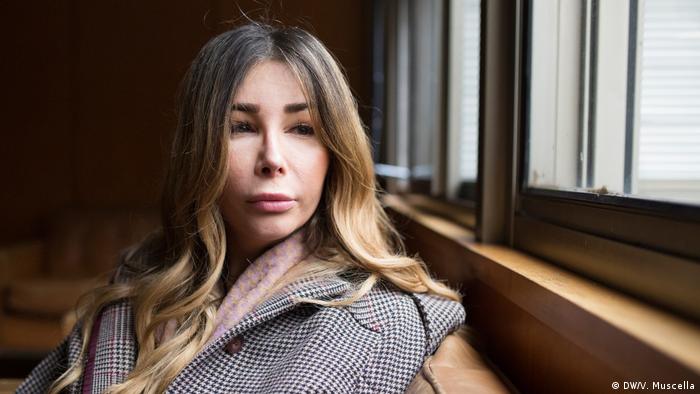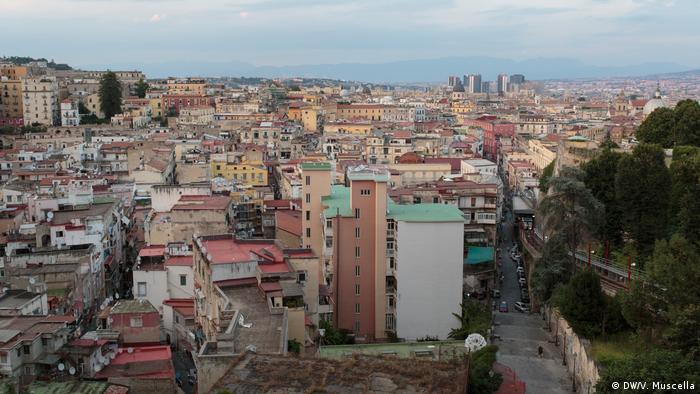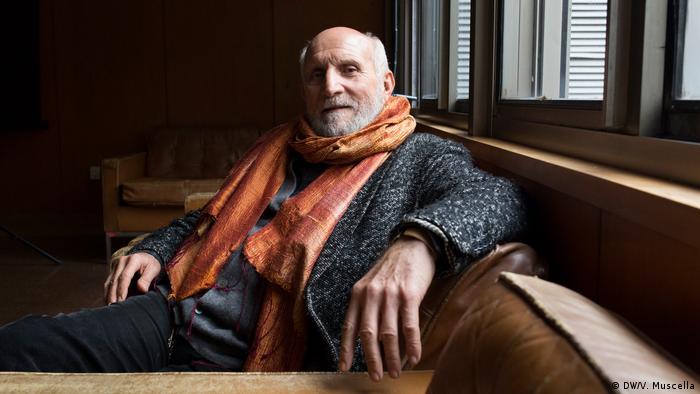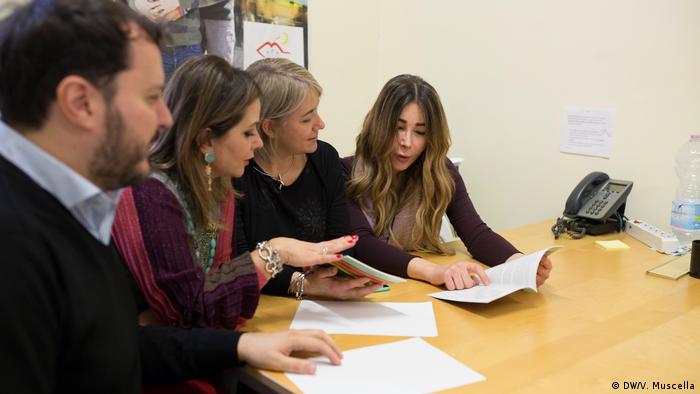Daniela Lourdes Falanga, her family's first male heir, was expected to follow the path of her mafia boss father. She overcame a brutal Naples childhood to become a prominent transgender rights activist.

Dedicated to the cause
Daniela Lourdes Falanga, 42, is the first transgender woman to chair the Naples branch of Arcigay, the leading Italian organization for the protection of LGBT+ people and the fight against gender discrimination. She was the first son of a local mafia boss.
The narrow alleys stretching from the Obelisk of Saint Dominic are a popular image on Naples postcards. Here university students stroll along Spaccanapoli, the main street that cuts through the historic city, drinking espresso and nibbling ricotta pastries. Short, slender doors lead into the vasci, one-room, ground-floor apartments that used to be homes for the poor but are now more often shops, cellars or even restaurants. In one of them, Daniela Lourdes Falanga is taking a break after a series of hectic days.
"I've spent the whole night providing free HIV tests to everyone who asked for one," says the 42-year-old, surrounded by banners and posters from the annual Pride Parade. "The stigma associated with HIV is still strong in the transsexual community, so many avoid taking the test."
Read more: Bangladeshi women in Italy fight for gender rightsThis small two-story office hosts the local headquarters of Arcigay, Italy's leading LGBT+ organization. A year ago, Falanga became the first transgender woman to be voted in to lead a regional chapter.
Falanga committed herself to the movement a decade ago, after a sex scandal involving a prominent Roman politician led to public outcry against the transgender community.
"I wanted the world to know that we were not monsters," Falanga says. "Transitioning gave me real freedom for the first time in my life, so I needed to spread the word."
Otherwise assertive, when she talks about the past, she trips over her words. "My family never allowed me to show off what I had inside," she says. "I was the effeminate firstborn of a Camorra family, and they always kept me in check."
Growing up in Gomorra
Falanga's father was a local boss in the organized crime syndicate rooted in the area surrounding Mount Vesuvius. He abandoned the family right after Falanga was born. She grew up in poverty with her mother.

A view of Naples from Castel Sant'Elmo
As a child, named Raffaele, she was compelled to attend Sunday lunch at her grandmother's house. Her father would cuddle all the children there but her. His indifference hurt: "He treated me like an inanimate object," she says.
Her mother and grandmother scrutinized her every move, cracking down on any trait associated with femininity: no music, no singing, no watching cartoons with female protagonists. "I even feared speaking, as the tone of my voice did not fit their expectations," Falanga says. And when she failed to meet those expectations, her mother beat her.
During her adolescence, her father was arrested and disappeared. Her mother started a new relationship with another man, who was shot dead while stealing a car when Falanga was 13. By the time she was 22 and had transitioned from male to female, she had heard news of her father just once: He had sent a letter to a close cousin, prohibiting any relationship with the son he had abandoned.
Growing up in such a harsh environment helped Falanga clarify ideas about her true nature. "I owed my complete awareness about being a girl also to the violent way in which that world influenced me," she says.
The city of the femminielli
For a transgender woman like Falanga, Naples is a special place: Activists claim the city hosts the second-biggest community worldwide.
"Mythological characters, or particular social groups who break the correlation between their biological sex and a specific gender, mixing characteristics of masculinity and femininity, can be found in several cultures," explains Professor Paolo Valerio, chairperson of Italy's National Observatory on Gender Identity. "But in Naples you find a very particular kind of subjectivity called 'femminielli,' men who think of themselves and dress as women."

Paolo Valerio, chairperson of Italy's National Observatory on Gender Identity
Their presence can be traced back to 1586, when, in his book "De Humana Physiognomonia," philosopher and alchemist Giovanni Battista della Porta described "an effeminate character with scarce beard" who shied away from men and willingly took care of the kitchen.
"The femminiello, though often practicing prostitution, enjoys the recognition of the neighborhood, because they participate in the typical 'fair' economy of the alley," says Valerio. Popular culture considered the femminielli bringers of luck, and they were often charged with drawing numbers at raffles.
Due to the existence of such a deeply rooted figure, Naples has been typically considered a welcoming and tolerant city. In 2009, after police arrested a transexual woman as an affiliate of a criminal family, some commentators even suggested the local mafia was more tolerant than others.
Falanga disagrees. "Camorra members can have a fondness for transsexual women, even have important relationships with them," she says, "but the problem comes when your child is one of them."
Twenty-five years after she had last seen her father, she met him by chance at a local school, where they both had been asked to tell their stories to students. He was serving a life sentence in prison.
"You have become beautiful," he told Falanga. "And we both cried for the whole event," she says.
Family is key
Falanga is skeptical about the extent to which Neapolitan society respects transgender people, despite the femminielli. "So far, Naples has accepted a social phenomenon that involves prostitution and marginality, so transsexual women are directly associated with sex workers," she says.

Falanga works at the University of Naples Federico II counseling students as well as at a help desk for LGBT+ inmates at a local prison
These barriers to genuine acceptance condemned older generations to live as outcasts. "If your body did not fit into a binary representation of gender than you got expelled from the labor market," Falanga says.
That is why she has begun working with local businesses, such as Naples' ANM public transport company and the Mediterranean Theater, to promote a culture of equal opportunities.
But when it comes to helping a transgender teenager to live a healthy and fulfilled life, family plays a crucial role. Falanga often meets mothers and fathers of trans children in her work. The new generation shows more awareness of the distress of gender dysphoria compared to her own parents, she says. It gives her hope for the future.
"If you grow up with your dear ones close, you can build your existence with self-determination," she says. "Otherwise, this remains a complicated city to live in."
---30---
Stonewall at 50: LGBT+ activists ask 'what's next?'
It’s the 50th anniversary of the Stonewall uprising. The riots and ensuing protests are credited with spurring the US gay rights movement, but five decades later, those who were there say there's more work to do. (28.06.2019)
Transgender refugees in Greece reclaim their dignity
On the back of a groundbreaking court decision, two transgender refugees have found the freedom to start a new life in Greece. Marianna Karakoulaki and Dimitris Tosidis report from Thessaloniki. (08.07.2018)
Prison blues? Italian startup gives inmates a break
Time in prison is often monotonous and tedious. An Italian startup wants to change that by experimenting with a form of democratic participation to foster social integration inside and outside. (14.09.2019)
Migrants put mafia mobsters behind bars in Palermo
Eleven shop owners who bravely took on their racketeers show that the southern Italian city's multiculturalism has had an impact on breaking down the traditional mafia methods. Ylenia Gostoli reports from Palermo. (13.06.2018)
Italian Mafia, bikers, Berlin clans: Europe's crime gangs
Organized crime is active across Europe, with groups generating over €100 million in revenue every year. Here's a list of some of the most prominent organizations. (05.12.2018)
Bangladeshi women in Italy fight for gender rights
The Bangladeshi community in Italy is the second largest in Europe. However, many women are still struggling to acclimatize, not least because of their husbands. Michele Bertelli reports from Rome. (03.08.2019)
Naples: LGBT+ activism beyond the pride parade
Naples is home to one of the world's biggest transgender communities, activists say. A grassroots movement here is fighting gender discrimination as it builds an alliance against stereotypes. (11.01.2020)
Indonesia's trans people build community in hostile world
No comments:
Post a Comment